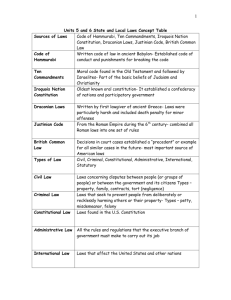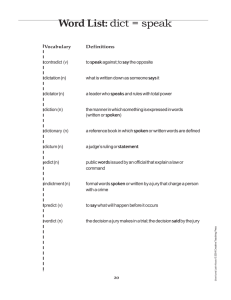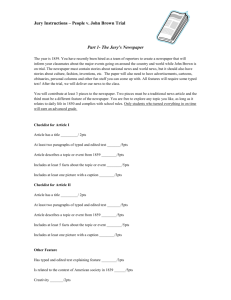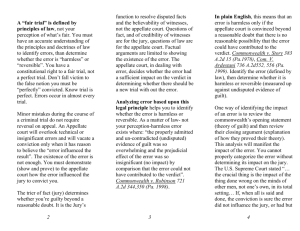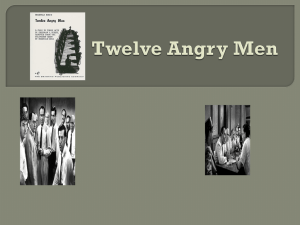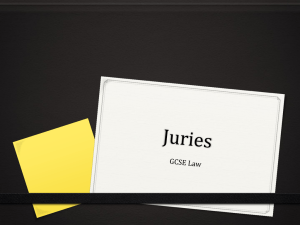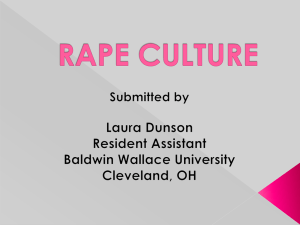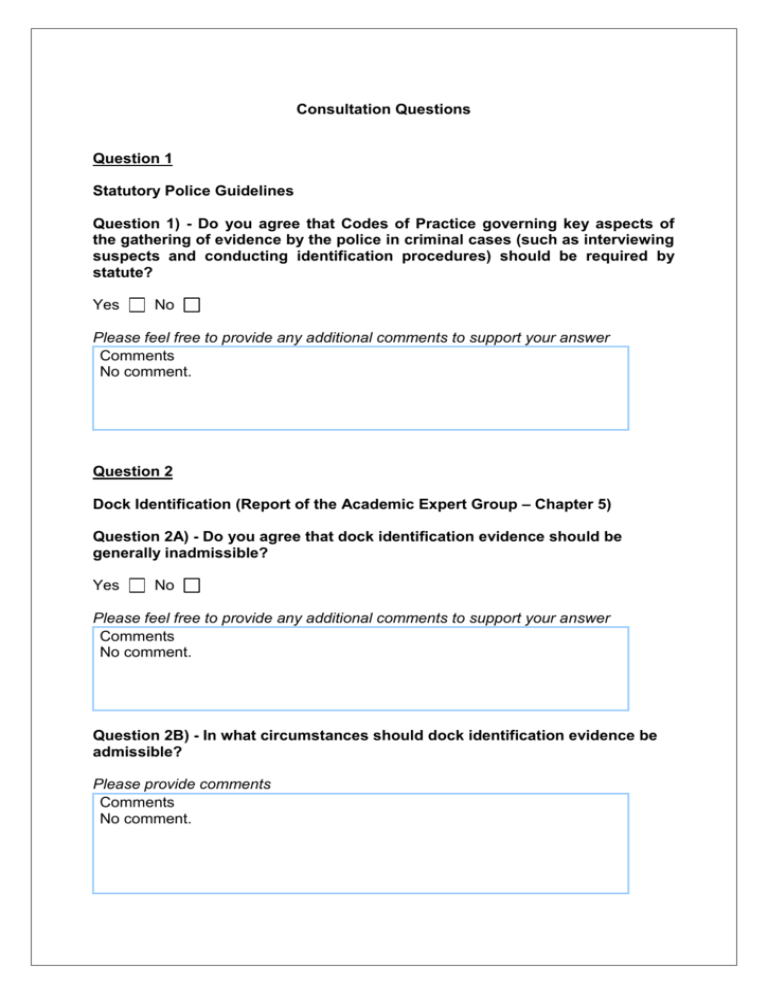
Consultation Questions
Question 1
Statutory Police Guidelines
Question 1) - Do you agree that Codes of Practice governing key aspects of
the gathering of evidence by the police in criminal cases (such as interviewing
suspects and conducting identification procedures) should be required by
statute?
Yes
No
Please feel free to provide any additional comments to support your answer
Comments
No comment.
Question 2
Dock Identification (Report of the Academic Expert Group – Chapter 5)
Question 2A) - Do you agree that dock identification evidence should be
generally inadmissible?
Yes
No
Please feel free to provide any additional comments to support your answer
Comments
No comment.
Question 2B) - In what circumstances should dock identification evidence be
admissible?
Please provide comments
Comments
No comment.
Question 3
Confession Evidence (Report of the Academic Expert Group – Chapter 6)
Question 3A) - Should corroboration be required in cases where otherwise a
confession would be the sole evidence?
No
Please feel free to provide any additional comments to support your answer
Comments
No. The recommendation of the Carloway review was that corroboration
should go across the board, and we consider that this approach should be
retained, rather than retaining it on a piecemeal basis for some crimes.
Question 3B) – Where a confession is corroborated by way of special
knowledge, do you consider that the defining characteristic of special
knowledge should be: (a) knowledge of a fact or facts relating to the crime
which could only be known by the accused if he was the perpetrator; (b)
knowledge of a fact or facts relating to the crime which were not in the public
domain; (c) some other formulation?
Please provide comments
Comments
No comment.
Question 4
Hearsay Evidence (Report of the Academic Expert Group – Chapter 8)
Question 4A) Should corroboration be required in cases where hearsay
evidence would be the sole or decisive evidence on which a conviction would
be based?
Yes
No
Please feel free to provide any additional comments to support your answer
Comments
No. See above.
Question 4B) What additional (or alternative) counterbalancing measures
should be required where hearsay evidence would be the sole or decisive
evidence on which a conviction would be based?
Please provide comments
Comments
No comment.
Question 5
Jury Directions (Report of the Academic Expert Group – Chapter 9)
Question 5) - Do you have any suggestions as to how jurors should be
instructed on the law and how to consider the evidence in a trial? For
example, should they be given written instructions from the judge?
Please provide comments
The Scottish Government have previously given a commitment to
introducing judicial directions in sexual offence trials to instruct juries that
inferences should not be drawn from delayed reporting or lack of significant
physical injury. Implementing this commitment would be a positive step in
trying to ensure that jury decision making is based on a factual appraisal of
the evidence, rather than notions of how someone is likely to react during or
after a rape or sexual assault.
Question 6
Recording of Police Interviews (Report of the Academic Expert Group –
Chapter 10)
Question 6A) - Do you agree with the general principle that all
questioning/interviewing of a suspect should be recorded by audio visual
means?
Yes
Please feel free to provide any additional comments to support your answer
Comments
Question 6B) Do you consider that any breach of the Codes of Practice
governing interview procedure should normally result in that evidence being
inadmissible?
No
Please feel free to provide any additional comments to support your answer
Comments
We agree with Academic group that this is unnecessary and would lead to
disproportionate results.
Question 6C) If you answered no, what do you consider should be the test for
admitting evidence where the Code has been breached?
Please provide comments
Comments
Admissibility should be decided by the judge or sheriff, taking into account
the circumstances.
Question 7
No Case to Answer Submission (Report of the Academic Expert Group –
Chapter 12)
Question 7A) - Do you agree that the circumstances in which the no case to
answer submission can be made should be broadened, and that a judge
should be empowered to uphold a submission of no case to answer if he or
she considers that no jury or judge acting reasonably could find the charge
proved beyond reasonable doubt on the evidence presented?
No
Please feel free to provide any additional comments to support your answer
Comments
We do not consider that this is necessary, and are concerned that it could
lead to further delays in an already lengthy and difficult process for
complainers.
Question 7B) – Should the accused be allowed to make a no case to answer
submission at the close of the whole of the evidence?
No
Please feel free to provide any additional comments to support your answer
Comments
We do not consider that this is necessary, and again are concerned that it
could be used routinely in sexual offence cases and cause further delay and
distress to complainers.
Question 8
Jury Size, Majorities and Verdicts (Report of the Academic Expert Group Chapter 13)
Question 8A) – Should a jury be required to strive to achieve a unanimous
verdict or is a verdict by a weighted majority acceptable?
Verdict by weighted majority
Please feel free to provide any additional comments to support your answer
Comments
The consultation paper proposes the current simple majority be changed to
one of two options: a unanimous verdict, where juries must reach the same
decision but could return a verdict by qualified majority (where all but one or
two jurors must reach the same decision) or by a weighted majority, where
a certain percentage of the members of the jury must reach the same
decision.
The proposal for moving to a system of unanimous verdicts is based on the
theory that a jury should act as a collective unit seeking to come to an
agreed view about truth. However, the reality for rape trials is that jury
decision making is influenced by prejudicial attitudes and sexist stereotypes.
Research indicates that pre-existing attitudes can negatively affect the way
in which jurors interpret evidence in rape trials. Research conducted in
England and Wales using mock juries suggests that notions of how a ‘real’
rape victim would react influences assessments of credibility, for example in
relation to delayed reporting or signs of significant physical injury1.
Rape Crisis Scotland is very concerned that, in light of what we know about
the problematic attitudes which may be affecting jury deliberations on rape
cases, increasing the jury majority will not lead to a consensus around truth
but instead make it even more difficult to secure a conviction. As much of
the debate around removing corroboration has focused on its impact in
particular on sexual offences, it would be very difficult to see its removal
leading to measures being introduced which actually worsened the prospect
of rape survivors being able to secure justice in Scotland.
Question 8B) - If you answered “unanimous verdict” to question 8A, what do
you think the qualified majority should be, should the jury be unable to reach a
unanimous verdict?
-1 less than the total number of jurors
-2 less than the total number of jurors
Other
Please feel free to provide any additional comments to support your answer
Comments
Question 8C) – if you answered “weighted majority” to question 8A, what do
you think that weighted majority should be?
Ellison & Munro, ‘Reacting to rape: exploring mock jurors’ assessments of complainant credibility’
(2009), British Journal of Criminology 202 & ‘A Stranger in the Bushes, or An Elephant in the Room?
Critical Reflections Upon Received Rape Myth Wisdom in the Context of a Mock Jury Study’ (2010),
New Criminal Law Review. 13.4: 781-801
1
Other
Please feel free to provide any additional comments to support your answer
Comments
Rape Crisis Scotland is concerned that moving away from a simple majority
could make it even more difficult to obtain a conviction in rape cases.
Question 8D) - Should the same number of jurors as is required for a guilty
verdict also be required for an acquittal verdict?
Yes
No
Please feel free to provide any additional comments to support your answer
Comments
We would not like to move to a system which results in regular hung juries;
the prospect of having to go through another trial and giving evidence a
second time would be very daunting for most complainers of sexual
offences. However, it would be helpful to consider if a process could be
introduced by which the Crown could apply for a re-trial in cases where the
a jury was either divided or the majority was very narrow. We do not
anticipate that this would happen on a frequent basis, however it could be
worthwhile in cases where something has gone wrong during a trial to such
an extent that justice has not been served but where there is no new
evidence to trigger double jeopardy. The views of the complainer should be
pivotal in any decision by the Crown to seek a re-trial.
Question 8E) - Do you agree that the size of a jury in Scotland should be
reduced from 15 to 12 persons?
Yes
No
Please feel free to provide any additional comments to support your answer
Comments
We do not have a view on this.
Question 8F) - Do you think there should be 2 or 3 verdicts in criminal trials?
2
Please feel free to provide any additional comments to support your answer
Comments
Rape Crisis Scotland believes that the ‘not proven’ verdict should be
abolished. The not proven verdict is most commonly used in rape cases.
According to the Scottish Government2, the proportion of people receiving a
not proven verdict for rape or attempted rape was 15%, the highest for any
crime type.
Jury members can be notoriously reluctant to convict in rape cases, even in
cases where there is significant evidence, and we are concerned that the
not proven verdict could contribute to wrongful acquittals.
An argument which has been used in the past for retaining the not proven
verdict is that it at least enables complainers to be reassured that the verdict
didn’t mean that the jury didn’t believe them. However, a not proven verdict
is still an acquittal, and can be just as devastating as a not guilty verdict.
Following an article in the Daily Record about the number of men accused
of rape who were acquitted by means of the not proven verdict, a number of
rape survivors and their families wrote into the paper to tell of the
devastating impact this verdict had on their lives (see for example
http://www.dailyrecord.co.uk/news/scottish-news/mum-who-endureddouble-rape-1393744). We believe that there is no convincing argument for
retaining this verdict and that moving to two verdicts of guilty and not guilty
would lead to a clearer and less confusing jury decision making process.
Question 8G) If you answered 2, what should these verdicts be?
Guilty and Not Guilty
Please feel free to provide any additional comments to support your answer
Comments
Rape Crisis Scotland supports the removal of the not proven verdict
because of our concerns that it is disproportionately used in rape cases and
that this is linked to a seeming reluctance for juries to convict in rape cases.
Retaining a not proven verdict as part of a two verdict system would in our
view simply replicate this problem.
2
Criminal Proceedings in Scotland, 2012-13, Statistical Bulletin, Scottish Government
Questions 9, 10 and 11
Additional Comments
Question 9) - Do you have any comments to make on proposals raised in the
Report of the Academic Expert Group that have not been mentioned in the
consultation document?
Comments
We are pleased to see the inclusion of independent legal representation,
although this does not actually form part of the recommendations from the
group. This is an issue which we believe deserves further consideration, as
it has the potential to reduce the level of trauma and violation often
experienced by complainers of sexual offences, and enable complainers to
more effectively access protection for their privacy rights.
Question 10A) - Do you think there are any additional matters to be
considered in relation to safeguards in solemn cases that are not raised in the
consultation document or in the Report by the Academic Expert Group?
Comments
Question 10B) - Do you think there are any additional matters to be
considered in relation to safeguards in summary cases that are not raised in
the consultation document or in the Report by the Academic Expert Group?
Comments
Question 11) - Do you believe that there would be any unforeseen
consequences arising from the changes discussed in the consultation
document or the Report of the Academic Expert Group? These could be in
relation to any aspect of the criminal justice system, for example the effect of
any possible changes identified on the position of victims and witnesses. If
so, what might these be?
We are very concerned that the proposals could have the unintended
consequence of making it even more difficult to obtain convictions in rape
cases, and could lead to an increase in the factually guilty being acquitted.

